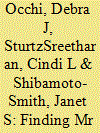| Srl | Item |
| 1 |
ID:
100296


|
|
|
|
|
| Publication |
2010.
|
| Summary/Abstract |
Language standardization lies at the heart of Japanese modernity. And numerous aspects of language development intended to fit the modern Japanese state intersect to regiment the linguistic imaginary regarding women's speech. Focus on Yamanote Tokyo-based joseigo ('women's language'), Standard Japanese and certain urban Kansai dialects in popular text and televisual representations of romantic heroines in geographically and linguistically peripheral areas of Japan has been documented, but has left the issue of linguistic masculinity and the romantic hero unexplored. The relation of male speakers to hyo-jungo was assumed and 'masculine' speaking practices as broadcast in public space have received little attention despite a popular understanding that certain forms (e.g., ore 'I', and assertive sentence final particle zo) are 'masculine' in effect. Here, we examine images of manly men in contemporary romantic representations set in dialect-speaking areas to illustrate the linkages between the romantic hero and the use of Standard Japanese masculine forms and to offer insight into the underexplored set of possibilities for male speakers circulated in popular media.
|
|
|
|
|
|
|
|
|
|
|
|
|
|
|
|
| 2 |
ID:
174113


|
|
|
|
|
| Summary/Abstract |
This article analyzes courtship between secondary characters Toshio and Hana in the televised NHK drama Massan. When viewed through the lens of sociolinguistics, their romance is fraught with linguistic and pragmatic problems. Toshio and Hana speak different non-prestigious dialects, and also spend much of their interaction arguing. However, they eventually marry. Their path to marriage and the contents of their speech are also interesting from the perspective of cultural linguistics because they reflect competing cultural models for successful (happī endo) romances derived from the analysis of romance fiction. One type of romance reflects Japanese ideals of social contextualization, while the other is based on translations from English, reflecting cultural importation.
|
|
|
|
|
|
|
|
|
|
|
|
|
|
|
|